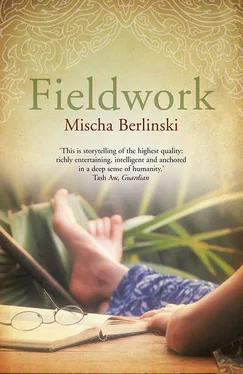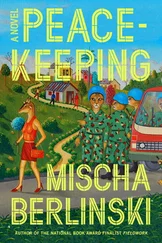Sang-Duan looked at her husband.
"I cannot turn her away," Khun Vinai whispered to his wife in the kitchen.
That evening, Sang-Duan served Martiya, and the family ate together from common dishes.
Khun Vinai had never seen Martiya more charming. She told stories from her childhood which made the children howl with laughter, and her imitations of the villagers were so spot-on that Khun Vinai would have sworn that Farts-a-Lot or the shaman George Washington was right in front of him. Only Sang-Duan was not amused by Martiya, looking at her all night long with the same distrustful stare.
That night, Kiss-My-Lips suffered another seizure. In the past, her seizures, although terrifying to watch, had passed quickly, after only five minutes or so. But this seizure, it was clear, brought the young girl to the edge of death before she came to. When finally the worst was over, and the girl was sleeping calmly, Sang-Duan turned to her husband.
"Vinai, you must," she said.
"How can I?" he asked.
"You must. I will not live with Rice. Do not bring the anger of Rice into the hut of our children. For I fear Rice, as I fear Lightning, and I fear Death."
Khun Vinai did not sleep the rest of the night. He watched the sun rise over the hills, then went to Martiya's hut. He found her awake, sitting cross-legged on the terrace, staring out over the fields.
Martiya saw the look on his face, and said, "And you too, Vinai?"
"I can't," he said.
Martiya gathered her bags and went back to Dan Loi village.
Khun Vinai stood up, and the Opium Man, seeing that his work for the evening was done, followed him. Khun Vinai did not linger at the door. He said, "Goodbye, my friend. We'll talk more tomorrow." Then he and the Opium Man were gone.
My bed was not particularly comfortable, but I think even on a down mattress with silk sheets I would have lain awake for a long time: insomnia is another of the effects of the drug. I found myself thinking about Martiya alone in that Dyalo village. How must she have occupied her days? How can an anthropologist do fieldwork if she can no longer talk with the people she intends to study? What else was there for Martiya to do in that village?
Her life, I imagined, had been reduced to her gin-kai . She was alone in the mornings, then she carried water back to her solitary hut. She ate alone. She read all day. Then, on those nights when she wasn't with Hupasha, she must have lowered the wick on her hurricane lamp and climbed into bed not having spoken to a soul since the morning. I thought about Martiya's letter to Tim Blair. She had met a man, she wrote, and was madly in love. Having no one with whom she might share her thoughts, she had decided to write to Tim himself. What she didn't tell Tim Blair was that her lover was all she had.
I finally fell asleep that night, and I dreamed of Martiya. Opium produces dreams of unusual vividness, and this dream was as real as any event of the daytime. I was in the kitchen of my house in Chiang Mai, making coffee, and Martiya was there also. I have never seen a photograph of the woman, but I knew that it was Martiya. I was excited to talk to her. "You must be Martiya van der Leun," I babbled. "I'm so happy to finally meet you. I've been looking for you everywhere, you have no idea how hard it's been to find you. Would you like a cup of coffee?" Martiya didn't say anything, and I stared at her. Her face was pale, and she was trembling. She was terrified. "It's okay," I said. "Have some coffee and you'll be fine." Then she began to whimper, but I couldn't make out what she was saying. "Just speak up a little," I said. "Please." But she wouldn't speak louder, and when I woke up, the only word that I was sure that I had understood was "Rice."
THREE. FAR OFF FROM THE GATES OF GOLD
THE NEXT DAY,Khun Vinai went back to Chiang Rai, still looking for roofing tiles. I spent the rest of the day in the hammock. I had nothing to do but wait — and watch the hills. By dusk the mountains were gray and the far mountains were indigo, and the farthest mountains just silhouettes. Sunset was a reddish-yellow spectacle, dramatic and fast. Then the night was moonless and almost perfectly dark. I heard bullfrogs in the paddies, and vast choruses of crickets, and the kiss-me birds croaked their mechanical whoo-tuk-tuk, whoo-tuk-tuk . It was dinnertime, but I wasn't hungry. Khun Vinai's truck drove up, and later, from the lodge, I heard voices, and a television. Then I saw a yellow light swinging back and forth. The light wandered from the porch of the lodge toward the car shed, then arced back up the side of the hill. Then the light came closer and I realized it was Khun Vinai, carrying a flashlight. When he got to the hammock, he sat down on a small chair just behind my head. He turned off the flashlight, and we sat for a long time in darkness.
After her arrest but before trial, Khun Vinai said, Martiya's visitors were limited exclusively to her lawyer, her family, and representatives of the American consulate. The pretrial detention lasted for almost two years. Then, after her conviction, Martiya, like all new prisoners, was forbidden guests for another year. So it was almost three years before Khun Vinai was allowed to see her.
Josh O'Connor would visit Martiya a decade later at the new prison just past the ring road. But the old prison, where Khun Vinai saw Martiya, was an altogether tougher place: Khun Vinai had never been in prison himself, but he knew women who had, and they talked about crowded cells, sometimes filled with upwards of fifty or sixty women, cells so small that the inmates were forced to sleep on the floor in shifts. The toilet was just an open trough along the far wall. The women cooked for themselves over a kerosene stove in the corner, and daily life was a constant battle against fleas, cockroaches, lice, and rats.
On the first day that he was allowed to see her, Khun Vinai went down to Chiang Mai. The prisoners entered the visiting room on their knees. It took Vinai a second to recognize Martiya, although she was the only farang : the prison authorities required that the women shave their heads for the first five years of their incarceration. She was "thin as a snake," Khun Vinai said, and her face was lined. She had very large ears. She recognized Khun Vinai, however, and her face flushed. She crawled in his direction, and as she crawled, she began to cry. Then she arrived at the table and lifted herself up on the stool, carefully keeping her head below his.
"Vinai," she said, after a moment. "Oh, Vinai."
Khun Vinai forced himself to smile. He had no idea at all what to say.
"Vinai, it's not your fault."
"No," he agreed.
"It's just that when they said there was a Dyalo man, I thought you were … I thought he had come."
Vinai didn't understand. "Who?" he said.
"Hupasha."
Vinai let her cry. He wasn't offended. The Dyalo have no taboo on staring, and he examined her strange, bony skull; her pale, thin face; her ruined hands. Only her eyes were familiar: when Martiya eventually wiped aside the last of her tears, her light blue eyes met Vinai's. No Dyalo woman in a Thai prison would have met Khun Vinai's gaze so fully.
Sang-Duan had prepared a box of food for Martiya, and Vinai was glad for the distraction. "This is for you," he said.
Martiya accepted the gift gravely. She examined the fresh mangoes, the bananas, the bag of mountain rice, and the six-pack of Coca-Cola. "These will be wonderful," she said. "Thank you."
Martiya was no longer crying. She even smiled, and there was something protective about her smile, as if Khun Vinai had just come out of the prison cell on his knees. The two sat without talking, neither knowing just where to begin.
Читать дальше












